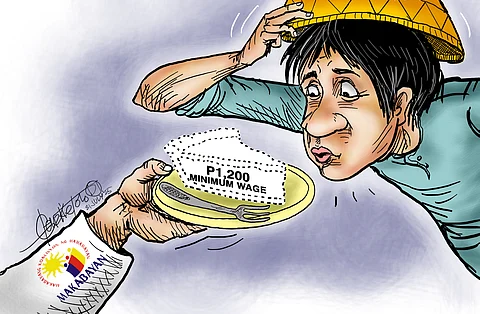
- NEWS
- the EDIT
- COMMENTARY
- BUSINESS
- LIFE
- SHOW
- ACTION
- GLOBAL GOALS
- SNAPS
- DYARYO TIRADA
- MORE

There’s a chasm between meaning well and doing well, and it’s a gap wide enough for an entire household to fall into. The Makabayan bloc in the House of Representatives, in true populist (or leftist, take your pick) fashion, has refiled its annual panacea for what ails labor: a P1,200 national minimum wage bill.
The move, while noble on the surface, is as perennial as the weeds of Congress — easy to plant, hard to uproot, and more ornamental than functional. Their argument is old wine in an older barrel: the regional wage boards have failed. They cite 36 years of poverty-level wages, demand the abolition of the regional boards, and call for a single, centralized wage that recognizes a “family living wage.”
Indeed, these are rabble-rousing words, as they are emotionally satisfying, especially to those who can’t make ends meet. But so are fairy tales. Let’s start with a reality check: over 99 percent of the businesses in the country are micro, small and medium enterprises (MSMEs).
These are not faceless conglomerates sitting on dragon hoards of profit. These are neighborhood workshops and small factories running on grit, loans, and prayer. They don’t have boardrooms; what they have are benches. Asking them to cough up a 100-percent wage hike is not asking them to share — it’s telling them to shut down.
The IBON Foundation, allied with the Makabayan bloc, of course, claims the wage hike would take only 29.7 to 49.1 percent of employers’ profits. This may be true, but only if your baseline is like those of conglomerates. Still, lumping the country’s economic giants with the mom-and-pop enterprises that make up the bulk of our economy is not economics — it’s arithmetic without understanding.
The problem with Makabayan’s slogans masquerading as policy is that they ignore nuance, they flatten the terrain, and they assume that all employers are villains and all workers are victims. But economics, unlike protest placards, does not thrive on absolutes: it’s messy, compromised, and rooted in trade-offs.
Will higher wages help the workers? Absolutely, but not if there are no jobs left to pay them. Mandating a national wage without factoring in regional disparities is economic vandalism. The cost of living in Metro Manila differs significantly from that in Bicol, Zamboanga, or Ilocos. Imposing a one-size-fits-all wage is like giving everyone size-10 shoes and calling it equality.
And then there’s enforcement. The bill promises severe penalties for violators — fines, damages, suspension of permits. But if history is a guide, it will be the honest small business owner who will suffer, not the rogue employer. Many will either lay off workers, reduce hours, or go informal to survive. Worse, some will shut down. And when they do, there goes your living wage, reduced to a slogan, no longer a figure on a paycheck.
What we need is not theatrical legislation but pragmatic solutions: strengthen the regional wage boards, give them teeth, make adjustments more responsive. Offer tax incentives or subsidies to small businesses that raise wages. Improve productivity — lower barriers to doing business. And for heaven’s sake, fix inflation.
The Constitution says workers deserve a just share in the fruits of production. But there must be production first. You can’t divide a pie that no longer exists. We don’t need more slogans. We need more sanity.
